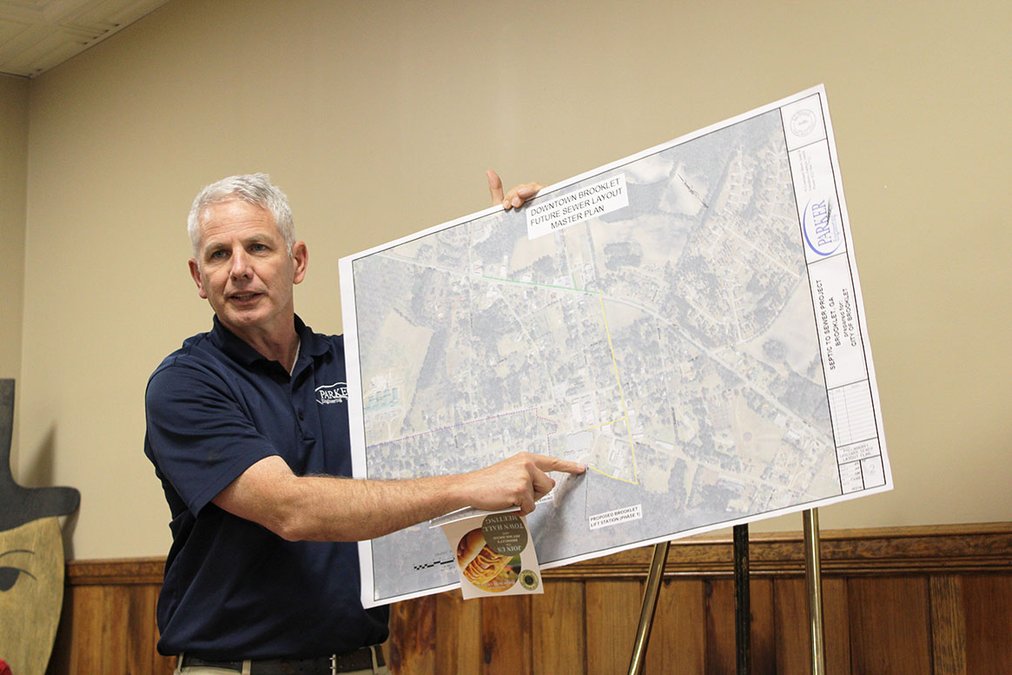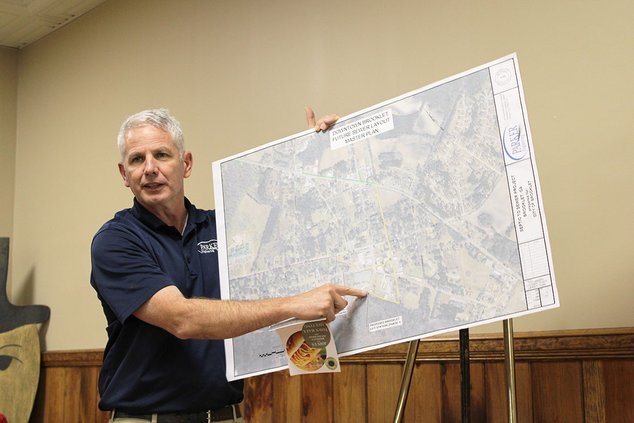During Brooklet’s “hot dog town hall” last Thursday, citizens heard about progress on Phase 1 of Brooklet’s sewer system – a lift station and pipeline connecting to Statesboro’s waste treatment plant. The two cities recently updated their agreement so that Brooklet has capacity to serve the planned new, larger Southeast Bulloch High School.
This was just one of the topics at the March 27 evening forum, officially the Hot Dog Social and Town Hall Meeting, hosted by Mayor Nicky Gwinnett and sponsored by the Brooklet Community Development Association, or BCDA. About 50 people came in for the hot dogs, chips and soft drinks at the Randy Newman Community Center and around 40 – counting city staff and council members among them – stayed for the speaking program.
“I guess the biggest thing tonight is, obviously, the sewer project,” Gwinnett said, a few minutes into his remarks. “And I want to thank Mr. Charles Penny, the city manager of Statesboro, for his very important role in making this happen for us. This town tried this project 20-something, 25-plus years ago, with no success, but graciously, with the city of Statesboro and Bulloch County, and our folks and all of the people that put in the hard work on it, we’ve finally made it happen.”
Back in July 2023, Brooklet’s and Statesboro’s councils approved an intergovernmental agreement for Brooklet to extend a sewer line far enough to connect to Statesboro’s system and then pay Statesboro to treat Brooklet’s sewage at Statesboro’s existing treatment plant. The Bulloch County Board of Commissioners approved an easement that fall allowing the pipeline to be buried along county road right of ways.
In early January 2025, county and Statesboro city officials and some state officials joined Brooklet officials and their contractors for a groundbreaking ceremony for the overall sewer system and its first phase. Phase 1 itself doesn’t target any customers, but contractors are installing a pumping station and about six miles of 12 -inch diameter sewer main from Brooklet to link to the nearest Statesboro main in the direction of the treatment plant.
During brief remarks at last week’s forum, Wesley Parker, Brooklet’s contracted city engineer, also thanked county and Statesboro officials for working with Brooklet.
“It’s been a good partnership. It’s a six-mile line. They’ve done about one and a half miles of it,” Parker said, also referring to the work of Shockley Plumbing, the contractor whose crew is installing the pipeline for Brooklet.
A different contractor, Y Delta, is installing the lift station with its two large pumps and backup generator. Parker and Y Delta Vice President Jody Rogers were seated as panel members with Brooklet’s interim City Manager Carter Crawford, who is also a consultant in the mayor and council’s ongoing search for Brooklet’s first permanent city manager, and contracted City Attorney Ben Perkins and the BCDA’s Ellen Perkins to help answer questions during the Q&A session.
In recent months Bulloch County Schools officials have also been involved in discussions about Brooklet’s planned sewer system because the Board of Education is interested in connecting the planned new 2,000-student Southeast Bulloch High School so that it will not need to use board-owned land for a separate wastewater treatment field. Meanwhile, Brooklet city officials hope to make not only that school, which is slated to be completed 2029 or 2030, but also the three current schools in and near the Brooklet city limits, customers of the sewer system.
Up to 450,000 gpd
Especially to accommodate the planned new high school, the Statesboro and Brooklet councils recently approved an update to their 2023 Brooklet wastewater system intergovernmental agreement.
“The BOE has indicated their engineer’s estimate for sewer capacity (for the new SEB High) is approximately 150,000 gallons per day,” Statesboro Assistant City Manager Jason Boyles noted in a March 13 memo.
So the amended agreement, approved by Statesboro City Council on March 18, when Gwinnett attended the Statesboro meeting, and by Brooklet City Council on March 20, increases the maximum capacity at the Statesboro treatment plant available to Brooklet from the original 300,000 gallons per day to 450,000 gpd. Penny and Boyles said this is within the capacity of Statesboro’s plant, with residential development occurring within Statesboro adding far more volume than Brooklet is likely to in the near future.
In the original agreement, Brooklet was required to pay Statesboro a one-time $160,000 “aid to construction fee” for the first 100,000 gallons-per-day capacity in two installments: the first $80,000 within 90 days of Brooklet giving a contractor a notice to proceed with building its sewer system, and the second $80,000 on or before the day Brooklet’s sewage begins flowing to Statesboro’s plant.
Statesboro would then charge Brooklet 1.5 times Statesboro’s in-city residential sewer rate for 1,000 gpd of sewer flow, stated as $3.19 as of July 1, 2023.
Beginning in the future when Brooklet’s sewer flow exceeds 100,000 gallons per day, Brooklet would then pay Statesboro a new one-time aid to construction fee of $640,000 for an additional 200,000 gpd capacity. This remains in the amended agreement, which now provides that, after exceeding 300,000 gpd, Brooklet would pay either an additional fee, yet to be determined, either for increments of 25,000 gpd or for each new connection to Brooklet’s sewer system.

Bites of an elephant
Hot dogs were the meat of choice for last week’s town hall meeting, but Brooklet’s mayor served up a metaphor about a larger main course.
“I kind of think of it like this: The city of Brooklet has had a big elephant lying on our plate for the last 25-plus years. Finally, a couple of months ago, we took the first bite out of that elephant.,” Gwinnett said. “I’ve had a lot of people say, ‘Well, when is the rest of the town going to get sewer?’ Well, the only thing that I can say simply is, it all depends on how long it takes to eat that elephant. It’s a long, drawn-out process, we all know that, and very expensive, and It’s going to take many years.”
“But thank goodness, after all these years we’ve finally taken the first step…,” he continued. “You’ll never get to the end without the first step.”
He and council members plan to hold a work session meeting May 10 to determine what sewer rates Brooklet’s existing water customers would need to pay to be connected to the system. That needs to be decided by the end of 2025, Gwinnett said, noting that a previous schedule of sewer rates approved by the council is for planned subdivisions and other new and future developments.
Phase 1 of the project generally appears to be on schedule for completion by the end of 2025, and some customers could be connected by then, according to mayor. He said some changes have been made in the plans to “allow some relief downtown on the Mexican restaurant and bank side of Main Street, hopefully by the end of the year.”
Also expanding its water system, the city recently completed installation of a third well, beside Brooklet First Baptist Church, and he thanked the church for selling the city a half-acre lot needed for the well “in close proximity” to the existing water tank.
Brooklet has recently received a grant “in the $600,000 range” that will allow a larger water line from the new well down U.S. Highway 80 to Cromley Road.
“With that water line expansion, and with the sewer line beginning to take shape, this should allow us some commercial development, especially in the downtown area, and hopefully in the next few years, or some amount of time, on Highway 80,” Gwinnett said.
But he also spoke of a need for controlled growth. He noted that the council recently approved a rule limiting the number of new sewer taps to be created to 100 per year, especially with one developer’s proposed subdivision in mind that could eventually add several hundred homes, but in built in phases. With the new rule, that development could take “five, six, seven years to build,” the mayor said.


